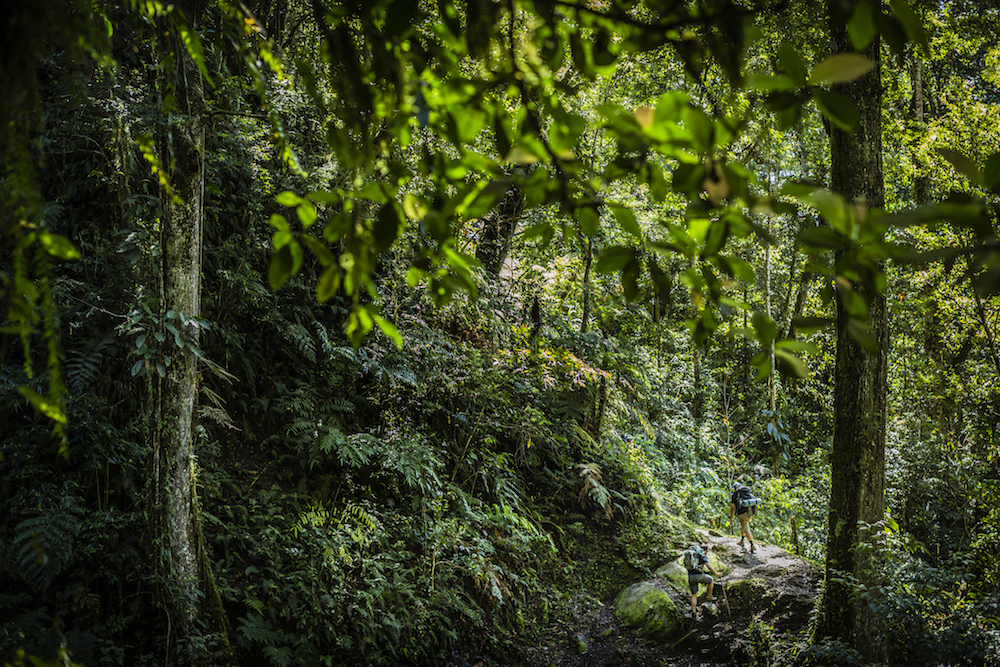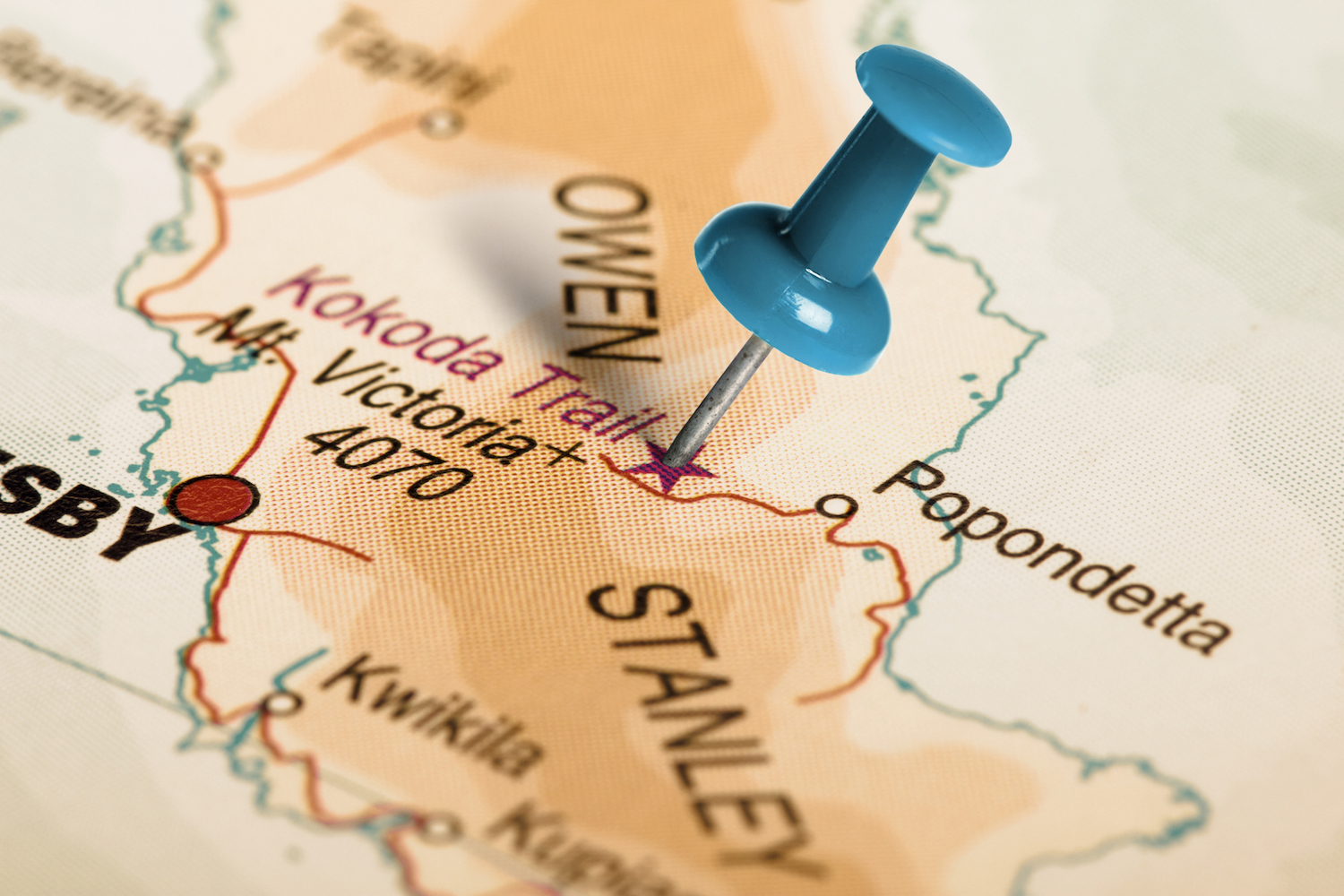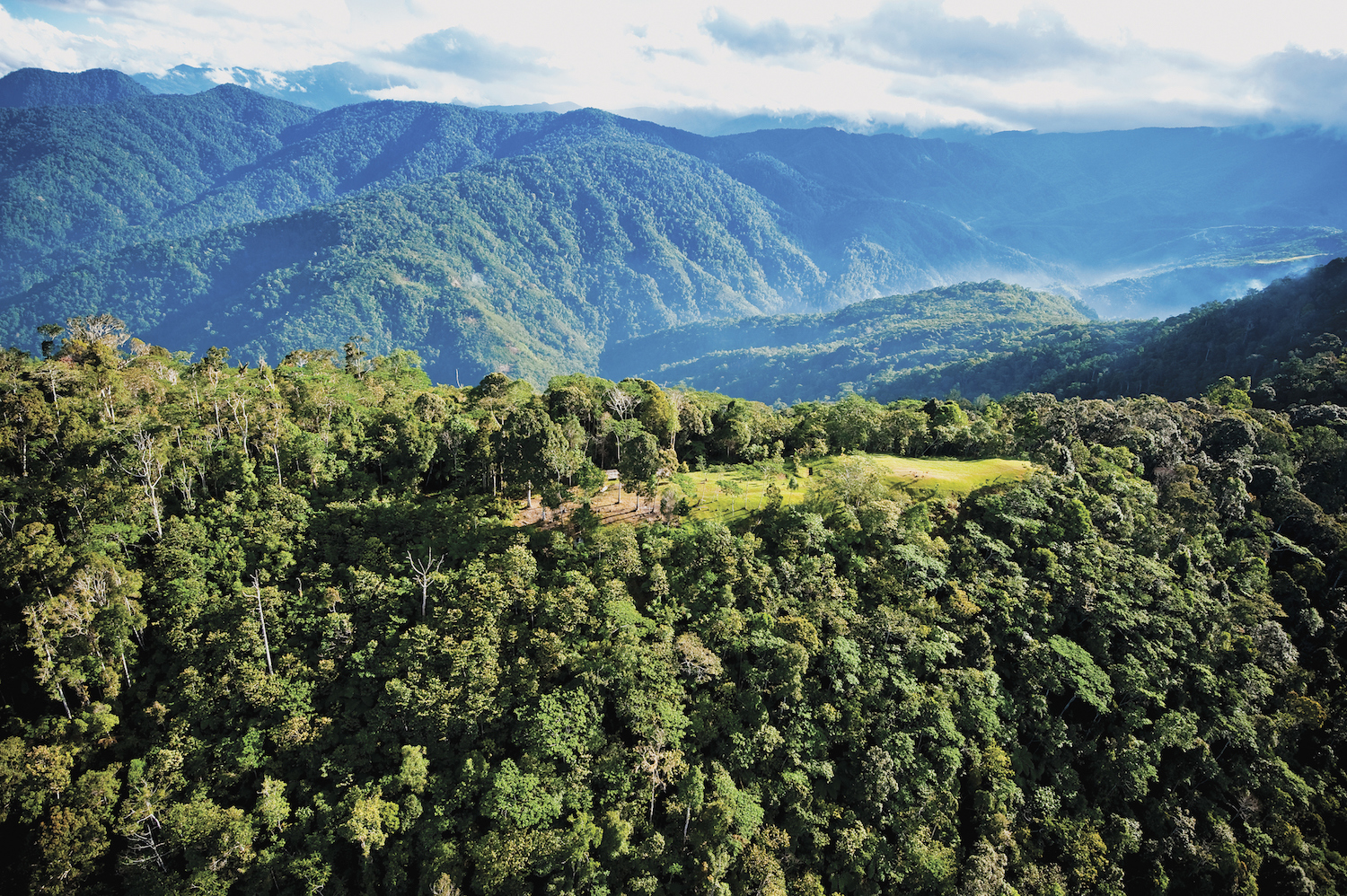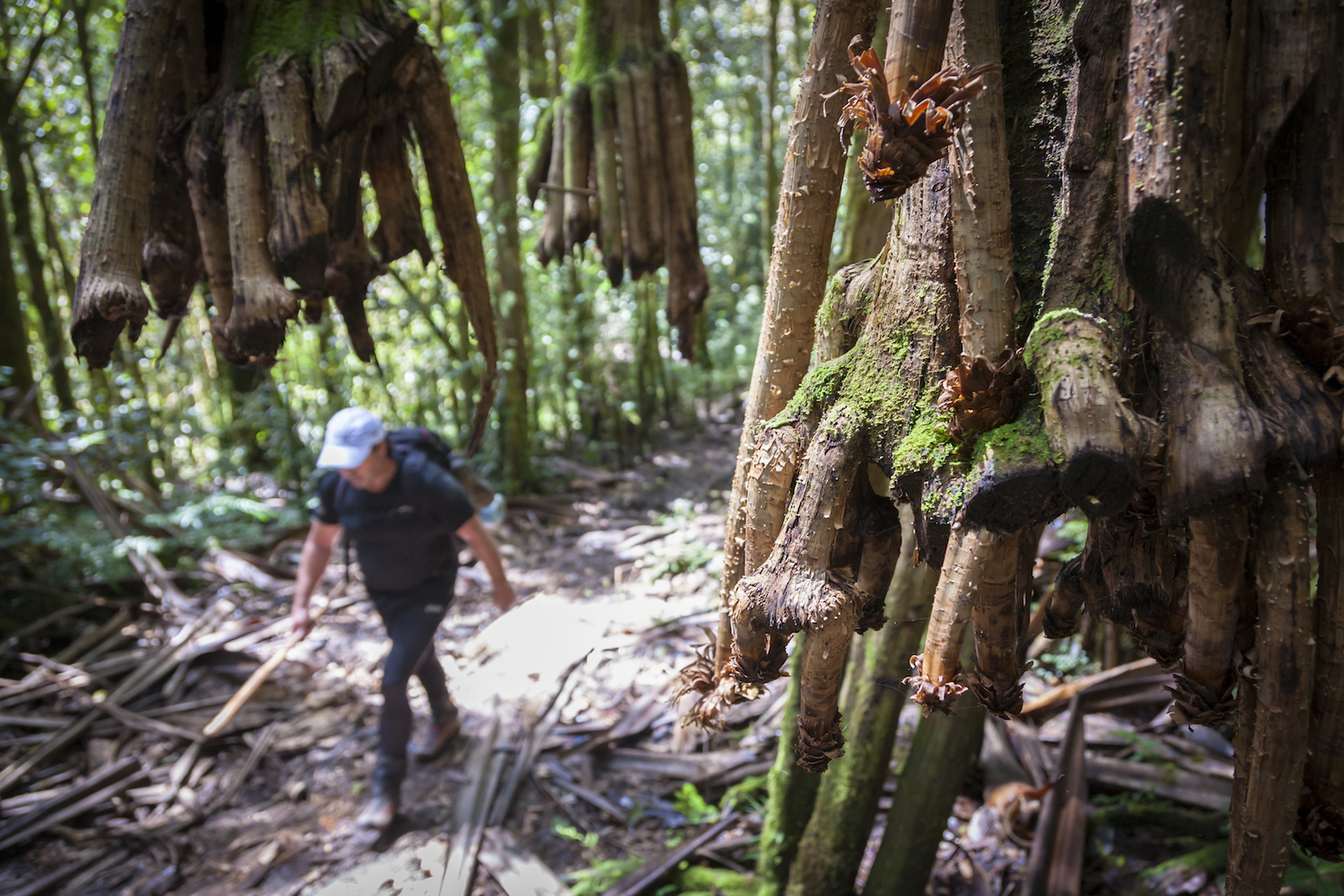
The non-for-profit organisation is hoping to not only raise awareness about the ongoing mental health crisis facing soldiers, but also fund nine psychologists for trauma informed care and back more participants in their critical social connections program.
We spoke to Lynn about what it takes to traverse the course of one of the most important and mythologised battles for Australians, and what can be done to support our soldiers and their mental health.
Of your 99 treks so far, can you pick one that’s most memorable?
I suppose the one that put the trail on the map, was the celebrity trek I ran across in 1996 which involved Angry Anderson and Colette Mann and Daryl Braithwaite and all those sort of people, and that program that they did on it was the highest rated program ever for A Current Affair. And that proved to me that people want to know more about Kokoda and I think was the start of the real interest in trekking Kokoda.
And on that note, why is the Kokoda trek so important?
Well, as somebody once said, at Gallipoli, we fought for Britain and lost, but at Kokoda, we fought for Australia and won and Gallipoli is our World War I, iconic gateway, if you like, to our Anzac heritage and Kokoda is our World War II gateway to that heritage. It was Australian territory at the time. It had the same status as the ACT and the Northern Territory have today. It was Australian territory. It is the first time that we’ve ever been invaded by somebody who wanted to take us out and our troops who were untrained, outnumbered, outgunned, out everything, went up there to hold the line until our professional forces were brought back from the Middle East to go and support them and during that critical phase – the stories of the sacrifice, the endurance. One of them who just died last week, his funeral was last week, Arthur Grassby, was 16 years old when he went on the first patrol over there. He was 16 years old in his first battle, the biggest battle on the Kokoda campaign was at Isurava, halfway through that four day battle, he had his 17th birthday.
Just remarkable stories and they’re Australian stories. We’ve run a leadership program with the RSL, Kokoda Youth Leadership Challenge. We put 500 young leaders, male and female, aged between 16 and 25, across the trail, and as a result of the experience, they’re suited with what I call the spirit of Anzac. They’re very proud of themselves, justifiably so. It just has a special connection. It has no peer in regard to a real pilgrimage where you actually get to walk in the footsteps, you get to experience the conditions under which our diggers fought and died. You get everything, except having somebody shooting bullets at you. It’s a great practical lesson today in the ability of the human spirit to conquer adversity. It’s not adversity like it was 75 years ago, but it’s still a significant adversity.
RELATED: Are You Special Forces Material?
Could you kind of talk me through some of those physical challenges and what the biggest physical challenges of the Kokoda trail are?
Well, the first major challenge is fear of not making it and everybody has that. When they arrive in PNG, even though they’ve done the training, they’ve got all the information they need and so forth, they’re still, on that first night, according to my feedback, there is still fear, will I make it? Will I be able to keep up with the others? How will I handle it? All that sort of stuff. And so, there’s that fear.
The initial two days of the trek, you’ve gone from a temperate climate to a tropical climate and it’s what I call the dehydration zone. You’ve got to be very, very careful of your fluid intake, keeping your electrolyte balance right and so forth, while you’re going through the acclimatisation, so we’re very conscious in that first couple of days of saying, look, don’t force yourself beyond. If you feel tired, take a five minute break and we’ll push on and you’ll be probably doing that every 40 minutes or so, for the first couple of days.
Couple of days later, they’re going from the bottom of the mountain to the top of the mountain without stopping because they’re conditioned to it. They’ve acclimatised to it. Their muscles are toughened into it. They’ve gotten into the spirit of it, the camaraderie. All those facades we carry around in our life back down here in the concrete treadmill are stripped away. Standing in front of a bush dunny with a roll under your arm in a queue chatting away, waiting for your turn, it’s pretty hard to bullshit anybody in that sort of environment. And look what comes out of that, as I say, it’s a politically incorrect free zone and blokes are blokes, sheilas are sheilas, and the camaraderie that develops and the wit that develops and so forth, is just fantastic.
What kind of training is required before taking on the Kokoda?
At least three months of what I call endurance training. You don’t have to load a heavy pack and climb mountains. You’ve got to have good aerobic capacity because if you have good aerobic capacity, it allows you to recover when you take those breaks. If you don’t have aerobic capacity, when we take a five minute break, you know you’re going to need six minutes and then seven minutes and then you start to go into aerobic debt and debt is painful, whatever form of debt it is, so it’s important to have good aerobic capacity.
I train for about two and a half hours a day, six days a week, but I’m 75 years old, so I’m a lot slower, not as fast as I used to be, but I know that I’ve got aerobic capacity. I don’t train on hills. I don’t put backpacks on, I just keep my aerobic capacity up and then they can toughen in with a few hills in the last six weeks, but be careful not to overdo it in case they suffer a stress injury of an ankle or a knee or a hip or something like that. Just common sense, basically. It’s what I call common sense fitness.
RELATED: Strength Secrets Of The SAS
What about nutritionally, what kind of things are you eating on the trail and what kinds of things should you be eating in the lead up?
Well, it’s just good healthy food, definitely not fast food, just common sense eating. There’s no need to change your diet. You could make some sacrifice if you’ve been indulgent in some of the treats you give yourself, but basically common sense.
On the trail, we eat exceptionally well. We buy all our food in Port Morseby, from the supermarkets there. We don’t have fresh food, obviously, but generally speaking, we have a range of mueslis and cereals and powdered milk and tea and fruit for breakfast. Biscuits, jam, all that sort of stuff. Lunch, we usually have pasta, noodles, that sort of thing, to provide you with the carbos you need for the afternoon.
And then, dinner, we have a spread. We have our own PNG cooking team now. We’ve developed that over the years and they are just exceptional people. They go ahead, we have cooks and they go ahead and set up the campsite each night. By the time we get in, they’ve got a full menu. They’ll have meat and vege or rice, pasta, kaukau – the sweet potato up there – tropical fruits. We also cater for… I think we’ve catered for every type of diet that’s imaginable over the last couple of years, vegan, coeliac – I’m amazed how many ailments people have but we cater to them and they’re always happy with it.
Are you walking with packs as well?
They’ve got a choice, basically. They can hire a porter and I recommend that people engage a porter because you don’t need to carry a 15 kilogram backpack over there to prove you’re as tough as whatever. If you employ a porter, the porters out there are the best people you will ever meet in your lives. They are the grandsons of the Fuzzy Wuzzy Angels. They are masters of their environment. When you slip, they will catch you before you slip because they know where you’re going to slip and when people are just about to go arse up all of a sudden there’s this black vice like grip on their shoulder and they look around and this is flashing, white smile. They take their job of getting people safely across the trail very, very seriously. It’s a badge of honour for them and they’re no different to their grandfathers were during the war.
So, it’s tough enough. You don’t need a pack on your back. It’s tough enough without a pack, just a day pack, with your water and some electrolyte and all that sort of stuff and it creates employment for the local people which is the most important thing.
RELATED: Depression, Drug Addiction And Suicide Abnormally High In Defence Veterans
What are your thoughts on the timing and scope of the new independent body investigating the high incidence of military veteran suicides?
I’m not sure you need a royal commission into that. You certainly need an inquiry into it. There’s no doubt about that. You know, veterans’ issues, over the years, I’m a Vietnam veteran and when we came back from Vietnam, a lot of them had issues because they were betrayed. They felt they were betrayed with the marches and action against the war in Vietnam and so forth. And then, with Afghanistan, Iraq, it’s a new generation with the same issues.
The RSO is probably a bit, as worthy an organisation as it is, I don’t think it’s totally in tune with what we call contemporary veterans. And so, Soldier On has filled that niche, if you like, and the great thing about Soldier On is they have empathy with the current veterans and I think that’s just such an important thing.
I think one of the phrases they use is, because, when a veteran gets out of the army, they’re sort of left alone in many instances. What they miss is the brotherhood of the service or it’s the brotherhood and sisterhood these days. But, what they’re talking about is rebuilding that brotherhood, reconnecting, letting them know that there’s somebody out there that they can talk to. There’s somebody out there that will engage them, that will offer assistance, whether it’s employment, or whether it’s health or whether it’s training or whether it’s just getting families together.
Have you taken a lot of veterans over the Kokoda trail as well?
I have. We take a couple from Singleton each year as part of the leadership program that RSL clubs sponsor and these blokes just restore my faith in the soldier. They are just the best of the best and on these leadership programs within about a day, everybody else in the group, who’ve got no army experience at all, they wake up in the morning, with Sandra Valley about half past four in the morning, a lot of them never, a lot of the young ones have never woken up at that hour before so you can imagine the shemozzle in their tent in their first one or two days as they’re trying to find stuff and put it on and they’d get out and here’s the army blokes just sitting there, everything’s packed, everything’s ready to go, and they’re thinking, how do they do that?
Then, after a day or two you can just see them attracted to these blokes getting hints and so forth and it’s just so good to watch. And they sort of, they become sort of unelected leaders within the group, if you like, but they very, very quickly earn their respect, who they are and what they are and what they do and the support they give and it’s just great.
Something like this for which we’re now doing with Soldier On is getting treks for veterans to do it. It’s just the best therapy because they’re back in their environment that they know about, they’re confident with, it extends their networks because they’re meeting successful people who are impressed by them. They’re very, very proud of their Australian heritage, their military heritage. It just ticks all of those boxes and it gives them a chance to reflect, reevaluate and rebuild their self esteem.
RELATED: 3 Australian Soldiers Open Up About Their Battle With PTSD



















